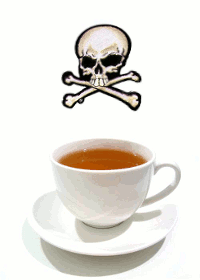Чай (часть третья)
The Russian word for tea is чай. It declines like this:
| Sg | Pl | |
| Nom | чай | чаи |
| Acc | ||
| Gen | чая | чаёв |
| Pre | чае | чаях |
| Dat | чаю | чаям |
| Ins | чаем | чаями |
You don't usually find the plural forms, but occasionally they are used to mean ‘types of tea.’ Mostly you just use the singular.
| Фу, чай уже остыл. | Yuck, the tea has already grown cold. |
| — С чем ты любишь чай? — Я люблю чай с лимоном. |
“What do you like with your tea?” “I like tea with lemon.” |
| — Ты любишь зелёный чай? — Мне всё равно, но мне больше нравится чёрный чай. |
“Do you like green tea?” “I have nothing against it, but I like black tea better.” |
| — Я очень интересуюсь чаем. — В смысле, ты любишь чай пить? — Да нет, у меня аллергия на чай. Я интересуюсь историей чая и тем, как чай стал таким популярным в России и Средней Азии. |
“I'm really interested in tea.” “You mean you like to drink tea?” “Oh, no, I’m allergic to tea. I'm interested in the history of tea and how it became so popular in Russia and Central Asia.” |
Tea always reminds me of a classic English joke. Supposedly between Lady Astor and Winston Churchill there was constant verbal sparring:
| ЛА: Винстон, если бы я была вашей женой, я бы подсыпала яд в ваш чай. ВЧ: Мадам, если бы Вы были моей женой, я бы сразу же его выпил. |
LA: Winston, if I were your wife, I would poison your tea. WC: Madam, if you were my wife, I would promptly drink it. |

1 comment
“I have nothing against smth” has a nice literal translation: “Ничего не имею против чего-либо". Anyway, at first I thought these “Ничего не имею против” and “Мне все равно” have slightly different meaning but after some consideration I think they are the same.
Form is loading...